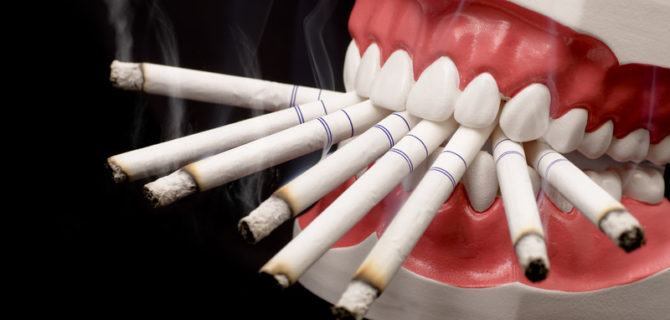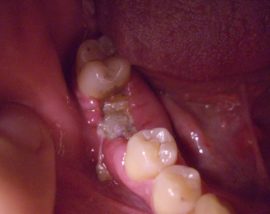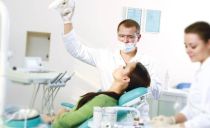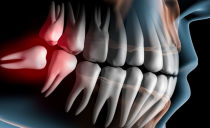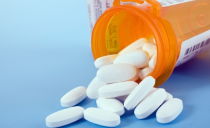How much can not be smoked after tooth extraction and why
People consider tooth extraction a very unpleasant procedure, but sometimes they do not take it seriously enough. The recommendations that the dentist gives after tearing out a dental unit should be followed to prevent unpleasant consequences. In the first days after extraction, the most important limitations apply, one of which is that smoking after tooth extraction, and especially wisdom teeth, is possible only after a few hours or even weeks.
Content
What can and cannot be done after tooth extraction
When the doctor removes the tooth, an empty hole remains in its place. Most often, it immediately fills with blood, from which a blood clot forms. This is a very important defensive reaction of the body, since a blood clot prevents the penetration of infection into the damaged tissues of the jaw.
During the healing period of the postoperative wound, the patient must follow the rules that prevent the development of the inflammatory process in the injured gum and accelerate its healing:
- If a regular tampon is placed in the hole, it is removed after 20 minutes, but very carefully - so as not to pull out a blood clot with it. With difficult removal, a swab with a medicine is laid - when the dentist tells you to remove it.
- Eating is only possible two hours after tooth extraction. It should not be hot or too cold. Very hard foods should be avoided; do not chew on the injured side of the jaw.
- It is impossible to provoke an increase in blood circulation in the jaw, as this is fraught with the discovery of bleeding. Therefore, it is forbidden to visit the bathhouse and sauna, perform hard physical work and apply warm compresses to the cheek after tooth extraction.
- It is forbidden to actively rinse the oral cavity, brush your teeth near the wound and try to clean the hole - in the process of performing such actions, you can injure your gums and destroy a blood clot.
- With complex removal, sutures are imposed, so you need to very carefully open your mouth, eat food.
- Anesthesia reduces attentiveness, so in the first hours after tooth extraction it is better not to drive vehicles and other complex mechanisms.
- Be sure to take the prescribed antibiotics.
How much can I smoke after tooth extraction?
Smokers, especially avid ones, cannot go without a regular cigarette for a long time. Many people are accustomed to smoking during stressful situations, and tooth extraction is a real stress for most patients.
But the minimum period during which no smoking is allowed is two hours. Better yet, abstain from cigarettes for several hours. The best option is to quit smoking for several days after pulling out the tooth when the healing of the hole occurs. It is best to consult your dentist and ask him how long after a tooth can be smoked.
With the removal of a wisdom tooth, complex removal with suturing on the wound, the period of compulsory abstinence from smoking increases. After such an operation, patients should not smoke from two days to one and a half weeks, depending on the complexity of the procedure and the condition of the oral cavity.
Why you can not smoke after tooth extraction
People not related to medicine do not always understand why smoking after tooth extraction is harmful.Tobacco smoke has a very negative effect on any living cells, and gums damaged during surgery are at even greater risk. Stop smoking for the following reasons:
- The components of cigarette smoke irritate the surface of the wound, which may cause bleeding, which requires additional therapeutic measures to eliminate it.
- An inflammatory process always develops at the site of the extracted tooth, but under the influence of toxins it can intensify and cause complications.
-
Due to a violation of the natural healing process of soft tissues and a decrease in local immunity, the risk of infection of the well increases.
- The penetration of infection into the hole and violent inflammation provokes suppuration, the development of alveolitis, abscess.
- Components of smoke affect vascular tone, which may cause swelling or excessive narrowing of the capillaries, which slows the flow of nutrients to injured gingival tissues and their recovery.
- Vascular constriction due to tobacco smoke can interfere with the formation of a blood clot, which causes alveolitis in a dry hole.
If a person lights a cigarette as soon as he leaves dentistry, he may feel a decrease in toothache. But such anesthesia is short-term and deceptive, because subsequently it leads to complications.
Is it possible to smoke a hookah when a tooth is pulled out
Hookah smoking, which implies inhalation of tobacco combustion products, does the same harm as cigarette smoking. In addition to nicotine, the inhaled mixture contains glycerol impurities. This substance overdries the mucous membrane of the oral cavity and has an even more fatal effect on the wound.
Hookah tobacco producers often claim that there are no resins in their products. But this fact does not make it less dangerous for humans - the remaining components of hookah tobacco still have a harmful effect on the mucous membrane of the oral cavity.
How many can not smoke electronic cigarettes after tooth extraction
Electronic cigarettes, according to WHO, have the same pathological properties as usual. In the process of vaping, several negative factors affect the oral mucosa at once:
| Risk factor | Effect on the mucous membrane of the oral cavity |
|---|---|
| Nicotine content | Irritation of the oral mucosa, change in vascular tone, provoking bleeding or the formation of a dry hole |
| Glycerol content | Dehydration of the oral mucosa |
| Non-certified vaping fluids may contain other hazardous substances. | The effects of chemical components not listed may be unpredictable. |
| Heating fluid to high temperatures | A gum burn is possible, in which wound healing is slower and with complications |
Dentists prohibit vaping after tooth extraction and claim that electronic cigarettes can be smoked only when the gums grow together - a few days after the operation.
Can I smoke after tooth treatment
It should be remembered that smoking causes harm not only after dental procedures and operations, but also after every cigarette smoked. Tar cigarette smoke stains on enamel. Microcracks can form in the enamel layer itself, which accelerate the development of caries.
The components of the smoke greatly irritate the gums, causing their blood supply to deteriorate, which also contributes to the development of dental diseases. Therefore, the more a person smokes, the more often he will have to visit dentistry for dental treatment.
It is undesirable to smoke not only when a tooth was pulled out, but also after medical procedures, especially those that were accompanied by gum injury. For example, when filling a tooth in the neck area, the tool can touch the gum.In order for her to heal faster, she needs normal blood supply, and under the influence of smoke the vascular tone is impaired. If you continue to smoke normally, you will have to treat the alveolitis or even remove the tooth.
It is not recommended to smoke during the period while the action of anesthesia continues. Narcosis reduces the intensity of cellular nutrition, and along with tobacco smoke, its inhibitory effect is enhanced.
Extraction of teeth and the effect of anesthesia have a stressful effect on the body. Healing a hole is no less difficult than the operation itself. Therefore, it is worth temporarily removing any smoking equipment so as not to provoke complications that are very difficult to treat.

